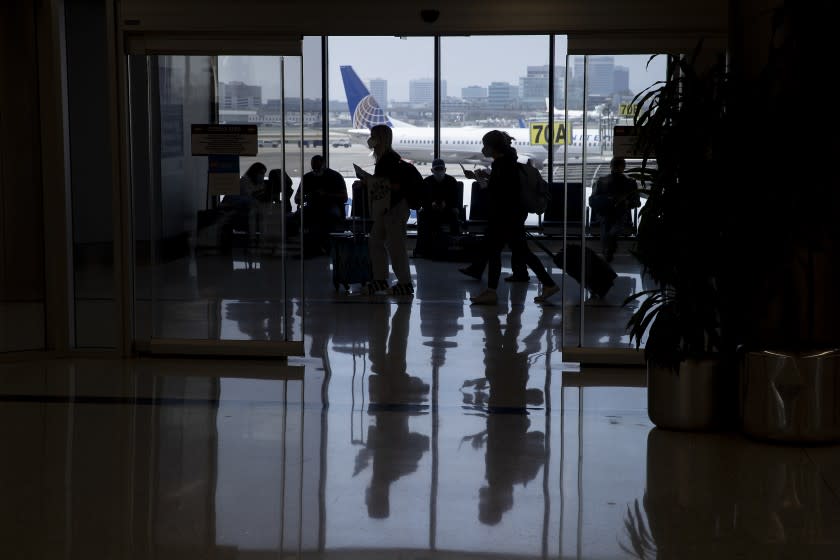Airfares are lower than usual right now — but prices won't stay down for long

The nation's airlines are sweating over an unexpected drop in business travel in the last few weeks — and that's welcome news if you're a traveler looking to save money.
This month, domestic airfares are down 5% from September 2019 and international fares down about 8%, drops that industry experts attribute partly to the traditional price slump that happens at the end of the peak summer travel season plus the rise in coronavirus cases due to the Delta variant, according to the travel website Hopper.
Prices for flights to Europe are at a five-year low, down more than 30% compared with the same month in 2019, according to the travel website.
But the discounted prices are not expected to last long, with increases likely when travelers start booking holiday trips.
"Everything we are seeing says people are definitely going to be traveling," said Adit Damodaran, an economist for Hopper.
The airfare roller coaster shows how the pandemic continues to affect the nation's $1.5-trillion travel and hospitality industry. For the first time since COVID-19 took hold in spring 2020, travel demand this summer began to match and briefly surpass pre-pandemic levels, giving airline executives hope that the industry would soon rebound from more than a year of financial losses.
But in the last few weeks, airlines have reported a steep drop in demand and an increase in reservation cancellations. September typically marks the end of the peak summer travel season and the start of business travel for conferences, conventions and meetings. Industry experts say the uptick in business travel never materialized because of the surge in COVID-19 cases.
As a result, airlines are forced to drop prices to fill the seats left empty by business travelers.
"In a normal year, the fares would stay high because people would travel for business, but that is just not happening," said Madhu Unnikrishnan, editor of the publication Airline Weekly.
The average domestic round-trip flight costs $260, down from $290 at the end of August, according to Hopper. International round-trip fares have dropped to an average of $700, down from $760 at the end of August.
The average round-trip price of a flight to Europe from the U.S. is $565, down from $665 at the end of August and the lowest price in five years, according to the website's data. That price was an average of $940 at this time in 2019.
But flying to Europe could become more difficult soon. The European Union recommended this week that its 27 nations reinstate restrictions on tourists from the U.S. because of rising coronavirus infections. The guidance isn't mandatory, and member countries have the option of allowing fully vaccinated U.S. travelers in.
The slump in business travel and rise in overall cancellations have airlines worried. Southwest, United, Delta and American airlines all revised their earnings outlook for the July-to-September quarter.
"The company continues to experience softness in bookings and elevated trip cancellations, especially close-in, as a result of the rise in the COVID-19 cases associated with the Delta variant," Southwest Airlines said in a Sept. 9 filing with the Securities and Exchange Commission. "Close-in" cancellations are usually defined as being within 21 days of departure.
In its own Sept. 9 investor update, Delta Air Lines said "initial revenue expectations were predicated on an acceleration of business travel through the September quarter. The pace of business travel recovery has paused as companies delay or scale down initial office reopening."
United Airlines said it expects the drop in demand to push total revenue down 33% in the July-to-September quarter.
Airlines are not the only businesses feeling the pain. The hotel industry is projected to lose more than $59 billion in business travel revenue in 2021 compared with 2019, according to a report by the American Hotel & Lodging Assn. and Kalibri Labs.
If the number of coronavirus cases drops or remains unchanged, travel experts say, Americans are likely to book air travel in high numbers for the Thanksgiving and Christmas holiday season. And higher demand usually means higher prices.
"Most airlines have said Thanksgiving and Christmas and year-end holidays remain solid," Unnikrishnan said. "So far, people are not canceling their holiday plans."
Bookings and internet searches for holiday flights have started to rise.
"Right now, flight prices for the holiday travel season are up across the board compared to both 2019 and 2020," said Giorgos Zacharia, president of the travel website Kayak.
Domestic round-trip airfares around Thanksgiving are priced at an average of $300, up 23% from 2020 ($245) but down 11% from the pre-pandemic 2019 fares ($335), according to Hopper. The average domestic round-trip airfares for travel around Christmas are $430, up 71% from 2020 ($250) and up 10% from 2019 ($390).
Rick Seaney, chief innovations officer at 3 Victors, a travel data company, said making flight reservations for the holidays can be tricky. Booking early — up to six weeks before departure — usually ensures that travelers get the lowest prices. But Seaney said another coronavirus surge could keep prices down, allowing travelers to book flights much closer to the holiday season.
"The question is will the prices get better or worse if you wait," he said. "It depends on what will happen with the pandemic."
This story originally appeared in Los Angeles Times.

